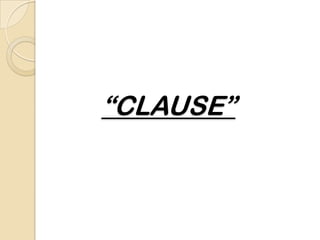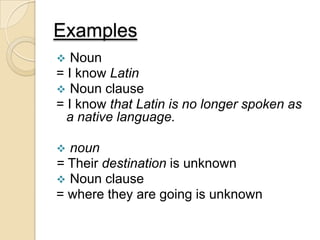9. clauses
- 2. ïķ the smallest grammatical unit that can express a complete thought. It contains a subject and a predicate.
- 3. Independent Clause ïķ a clause that CAN stand by itself. ïķ contains a subject and a predicate. ïķ also known as Simple Sentence. ïķ can be joined by using a semicolon or a coordinating conjunction (for, and, nor, but, or, yet, so).
- 4. Examples: ïķ I drive a bus. ïķ I am a doctor, and my wife is a lawyer. ïķ The doorbell rang. ïķ She smiled on the children. ïķ The girl is running. ïķ Since the hurricane hit, many people have been suffering.
- 5. Dependent Clause ïķ also called as subordinate clause. ïķ it DOESNâT express a complete thought. ïķ a clause that CANNOT stand alone as a sentence.
- 6. Examples: ïķ when they came in ïķ until your father gets home ïķ because the door was open ïķ when it started raining ïķ when the boy called her ïķ after the party
- 7. Example sentences: ïķ She sang a song when it was her turn. ïķ He hugged her although she was wet. ïķ Before the dance, she went home ïķ Whenever it rains, we get a ride from father. ïķ His room was clean before his friends came over.
- 8. Noun Clause ïķ takes the place of a noun in another clause or phrase. ïķ acts as the SUBJECT or OBJECT of a verb or the object of a preposition. ïķ it answers the questions WHO(m) or WHAT.
- 9. Examples ïķ Noun = I know Latin ïķ Noun clause = I know that Latin is no longer spoken as a native language. ïķ noun = Their destination is unknown ïķ Noun clause = where they are going is unknown
- 10. ïķNoun = ingredients ïķ Noun clause = What aunt Nancy adds on her stew
- 11. Adjective clause ïķ takes the place of an adjective in another clause. ïķ modifies a noun or pronoun ïķ answering the questions âwhichâ or âwhat kind ofâ ïķ begins with a relative pronoun who, whom, whose, which or that. ïķ relative adverbs such as when, where or why
- 12. Examples ïķ whom Mrs.Russell hit in the head with a chalk eraser. ïķ He has spilled over the glass and splashed onto the counter. ïķ Who loves pizza?
- 13. Examples ïķ Adjective = the RED coat ïķ Adjective clause =the coat which I bought yesterday
- 14. Adverb clause ïķ takes place of an adverb in another clause or phrase. ïķ answers the questions âwhen?â, âwhere?â, âwhy?â, âwith what resultâ and âunder what conditionâ.
- 15. Examples ïķ The premier gave a speech here. = the premier gave a speech where the workers were striking. ïķ As soon as they were married, she began to miss her bulldog. ïķ His dog follows him wherever he goes. ïķ She married him because he looked just like her bulldog.















